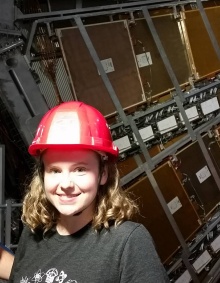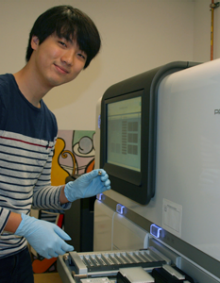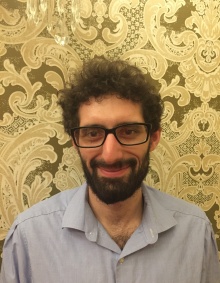Undergraduate Alumni Profiles
Anne Fortman, BS
Graduating Year: 2018
Honors Thesis Advisor: Salvatore Rappoccio
Current Position: Physics graduate student at Harvard
Since graduating from UB in 2018, I began my PhD in the Physics department at Harvard, working on the ATLAS experiment with the Harvard ATLAS group. During my first two years there, I took interesting courses covering particle detector technologies, quantum field theory, and electronics for physicists. In the fall of 2020, I moved to Geneva, Switzerland to do hands-on detector work at CERN, contributing to the integration and commissioning of a new muon detector in ATLAS called the New Small Wheel. I learned to work with the data readout system, and particularly contributed to the design and implementation of electronics calibration procedures. Now in 2022, I’m beginning to focus on my thesis project, a search for long-lived particles using the ATLAS Run 2 dataset.
The willingness of the faculty in the UB Physics department to give advice, mentorship, and encouragement was a real springboard that allowed me to successfully apply to PhD programs. In particular, my undergraduate advisor sought out research opportunities for me, as well as encouraged me to submit applications for competitive awards such as the Goldwater Scholarship and the NSF Graduate Research Fellowship Program. His support in bringing these opportunities to my attention and reviewing my applications was key to obtaining these awards.
In addition, a wider sense of community in the UB Physics department encouraged me to pursue physics beyond my undergraduate studies. I fondly remember the Friday social hours during which professors, graduate students, and undergraduates would all chat together over snacks. During these moments of shared community, the interest and enthusiasm that the faculty showed in the success of their students gave me the inspiration and confidence to continue my education in a PhD program.

Junhong Choi, BS
Graduating Year: 2013
Honors Thesis Advisor: Arnd Pralle
Current Position: Physicist for the United States Department of Labor
Since graduating from UB in 2013, I started my PhD in the department of Applied Physics in Stanford University, specializing in the field of Single-Molecule Biophysics. While both course works and research experiences at UB Physics have prepared me well for entering such an interdisciplinary field, I was able to expand my expertise further through completing the MS degree in the department of Electrical Engineering, specializing in signal processing, control and optimization. Now, I am done with the course works and finishing up my PhD by focusing on research.
The faculty mentorship prepared me the best. Throughout my undergraduate years, I received many critical advises and helps from the faculty members that shaped my path as a scientist.
The first key advice I received came when I was a high school senior. I had to choose a major for the college applications, but I couldn’t decide among three options. I fortuitously walked into an office hour of a professor from the Physics department, who took his time to convince me to major in Physics for its versatility. This lead me to participate in an undergraduate research opportunity within the department later. There again, I received a close-up faculty mentorship to apply for a research grant that funded me to participate in a scientific conference as a main contributor. After deciding to apply for the PhD, multiple faculty members provided direct help via providing comments on my applications and sending out recommendation letters. Without these mentorships and helps, I wouldn’t have admitted into the competitive graduate programs, nor would I have found my interest in research in the first place.

Dan Stoloff, BS
Graduating Year: 2011
Honors Thesis Advisor: Arnd Pralle
Current Position: Physicist for the United States Department of Labor
After graduating I worked in academia and private industry before eventually ending up as a physicist for the United States Department of Labor. I work in a laboratory that analyzes hazards for all US mining operations where I work on special projects in the advancement of this analysis. This can mean anything from doing statistical analysis on huge sets of health records to designing sampling procedures for chemical analysis to programming robotic weighing systems. The work can be challenging and unpredictable, and requires me to be able to tap into a huge range of scientific expertise and be creative and innovative in finding solutions. Its also extremely rewarding as the work I do can directly effect the health and safety of thousands of workers everyday.
The UB physics department taught me to try to really understand the world around me. Classes, labs and discussions with professors trained me in looking for the underlying reason for physical phenomena, and that if I had a good understanding of what was going on underneath the rest would follow. This has been incredibly valuable throughout my career, as any technical problem or new technique is much easier to solve or understand if I look for what's going on at the most basic level first.
